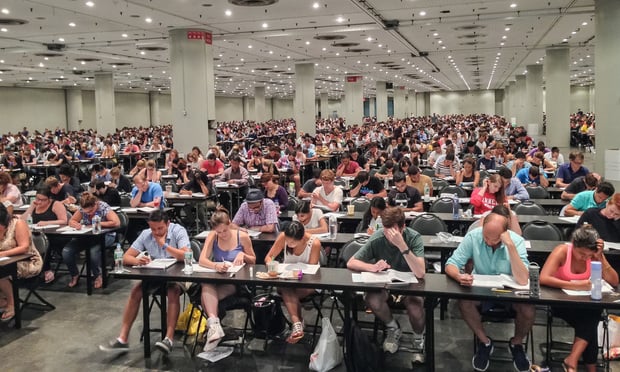Task Force Recommends Ditching Texas Bar Exam for UBE
Texas law graduates would no longer face the Texas bar exam, and instead take a test with fewer essay questions that could qualify them for a law license in 29 states, if the Texas Supreme Court accepts a recommendation from one of its task forces.
May 16, 2018 at 06:01 PM
4 minute read

Texas law graduates would no longer face the Texas bar exam, and instead take a test with fewer essay questions that could qualify them for a law license in 29 states, if the Texas Supreme Court accepts a recommendation from one of its task forces.
In a report this week, the Task Force on the Texas Bar Examination, which the high court created in June 2016, said that Texas should ditch the Texas bar exam in favor of the uniform bar exam, which still includes the multistate bar exam, but supplements those tests with a new online test focusing on Texas law.
“The UBE allows lawyers to move between states without spending the time and money needed to take multiple bar exams. This is advantageous for new law school graduates who wish to look for employment in more than one state—including both Texans who wish to move to other states, and those from other states who wish to practice law here,” said the May 14 task force report.
Twenty-nine states, the District of Columbia and the Virgin Islands use the uniform bar exam. Another advantage: rather than 12 essay questions on the current Texas bar exam, law grads would face just six essay questions on the multistate bar exam.
Justice Jeff Brown, the court's liaison to the task force, said the court would talk about the report in a conference on May 29.
“There's no decided-upon timeline,” Brown said. “I don't expect any action to be taken until a little further down the line.”
Court spokesman Osler McCarthy said it's not likely the court would take action until August, after it's issued all opinions in pending cases this term.
The task force wrote in its report that if the high court decided to adopt the uniform exam this summer, it shouldn't become effective until the February 2020 exam, to provide enough time for the Texas Board of Law Examiners to create a special Texas-law component, and to give law graduates enough notice to prep for a new test.
Many states supplement the uniform exam with a test that focuses on that state's local law. Texas should do this too, said the task force, possibly through an online exam focusing on things such as Texas legal ethics, the Texas Constitution, civil and criminal procedure and more. The Texas supplemental test probably wouldn't have any essay questions.
The task force followed up with several recommendations in case the Texas Supreme Court decided not to adopt the uniform bar exam. If so, the court should consider reducing the Texas bar exam's essay questions from 12 to six. But the court should keep the current Texas bar exam's score weighting, and keep the current minimum pass score of 675 out of 1,000.
If Texas did use the uniform bar exam, the passing score should be 270, roughly equivalent to the Texas bar exam's 675 passing score. In other states, uniform exam passing scores range from 260 to 280.
In case the court rejects the uniform bar exam, the task force also made a number of recommendations to speed up the grading period of the Texas bar exam. It now takes 10 to 14 weeks for law grads to get their results, mainly because essay grading takes so long. Reducing the number of essays would speed grading. Doubling the number of graders from 16 to 32 would allow results to come out in seven to nine weeks. Changing the regrading policy could speed up results. Currently an exam that falls six points short of passing is eligible for regrading, but the task force said it should be reduced to between three and five points to be eligible for regrading.
The task force also asked whether Texas law grads should get a diploma privilege allowing them to get a law license without taking a bar exam at all. The task force did not recommend this, but did say it's worthwhile for law schools to experiment with “alternative approaches to licensure.” For example, what if Texas law grads earned a law license from a clerkship under the supervision of a qualified attorney, or completed rigorous pro bono or law school clinic experiences?
Angela Morris is a freelance reporter. Follow her on Twitter at @AMorrisReports.
This content has been archived. It is available through our partners, LexisNexis® and Bloomberg Law.
To view this content, please continue to their sites.
Not a Lexis Subscriber?
Subscribe Now
Not a Bloomberg Law Subscriber?
Subscribe Now
NOT FOR REPRINT
© 2025 ALM Global, LLC, All Rights Reserved. Request academic re-use from www.copyright.com. All other uses, submit a request to [email protected]. For more information visit Asset & Logo Licensing.
You Might Like
View All
Proposed Rule Will Prevent Clients From Strategically Disqualifying Lawyers
4 minute read
San Antonio Estate and Trust Litigator Voted President-Elect of State Bar
3 minute read
Trending Stories
- 1Paul Hastings, Recruiting From Davis Polk, Continues Finance Practice Build
- 2Chancery: Common Stock Worthless in 'Jacobson v. Akademos' and Transaction Was Entirely Fair
- 3'We Neither Like Nor Dislike the Fifth Circuit'
- 4Local Boutique Expands Significantly, Hiring Litigator Who Won $63M Verdict Against City of Miami Commissioner
- 5Senior Associates' Billing Rates See The Biggest Jump
Who Got The Work
J. Brugh Lower of Gibbons has entered an appearance for industrial equipment supplier Devco Corporation in a pending trademark infringement lawsuit. The suit, accusing the defendant of selling knock-off Graco products, was filed Dec. 18 in New Jersey District Court by Rivkin Radler on behalf of Graco Inc. and Graco Minnesota. The case, assigned to U.S. District Judge Zahid N. Quraishi, is 3:24-cv-11294, Graco Inc. et al v. Devco Corporation.
Who Got The Work
Rebecca Maller-Stein and Kent A. Yalowitz of Arnold & Porter Kaye Scholer have entered their appearances for Hanaco Venture Capital and its executives, Lior Prosor and David Frankel, in a pending securities lawsuit. The action, filed on Dec. 24 in New York Southern District Court by Zell, Aron & Co. on behalf of Goldeneye Advisors, accuses the defendants of negligently and fraudulently managing the plaintiff's $1 million investment. The case, assigned to U.S. District Judge Vernon S. Broderick, is 1:24-cv-09918, Goldeneye Advisors, LLC v. Hanaco Venture Capital, Ltd. et al.
Who Got The Work
Attorneys from A&O Shearman has stepped in as defense counsel for Toronto-Dominion Bank and other defendants in a pending securities class action. The suit, filed Dec. 11 in New York Southern District Court by Bleichmar Fonti & Auld, accuses the defendants of concealing the bank's 'pervasive' deficiencies in regards to its compliance with the Bank Secrecy Act and the quality of its anti-money laundering controls. The case, assigned to U.S. District Judge Arun Subramanian, is 1:24-cv-09445, Gonzalez v. The Toronto-Dominion Bank et al.
Who Got The Work
Crown Castle International, a Pennsylvania company providing shared communications infrastructure, has turned to Luke D. Wolf of Gordon Rees Scully Mansukhani to fend off a pending breach-of-contract lawsuit. The court action, filed Nov. 25 in Michigan Eastern District Court by Hooper Hathaway PC on behalf of The Town Residences LLC, accuses Crown Castle of failing to transfer approximately $30,000 in utility payments from T-Mobile in breach of a roof-top lease and assignment agreement. The case, assigned to U.S. District Judge Susan K. Declercq, is 2:24-cv-13131, The Town Residences LLC v. T-Mobile US, Inc. et al.
Who Got The Work
Wilfred P. Coronato and Daniel M. Schwartz of McCarter & English have stepped in as defense counsel to Electrolux Home Products Inc. in a pending product liability lawsuit. The court action, filed Nov. 26 in New York Eastern District Court by Poulos Lopiccolo PC and Nagel Rice LLP on behalf of David Stern, alleges that the defendant's refrigerators’ drawers and shelving repeatedly break and fall apart within months after purchase. The case, assigned to U.S. District Judge Joan M. Azrack, is 2:24-cv-08204, Stern v. Electrolux Home Products, Inc.
Featured Firms
Law Offices of Gary Martin Hays & Associates, P.C.
(470) 294-1674
Law Offices of Mark E. Salomone
(857) 444-6468
Smith & Hassler
(713) 739-1250







